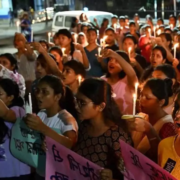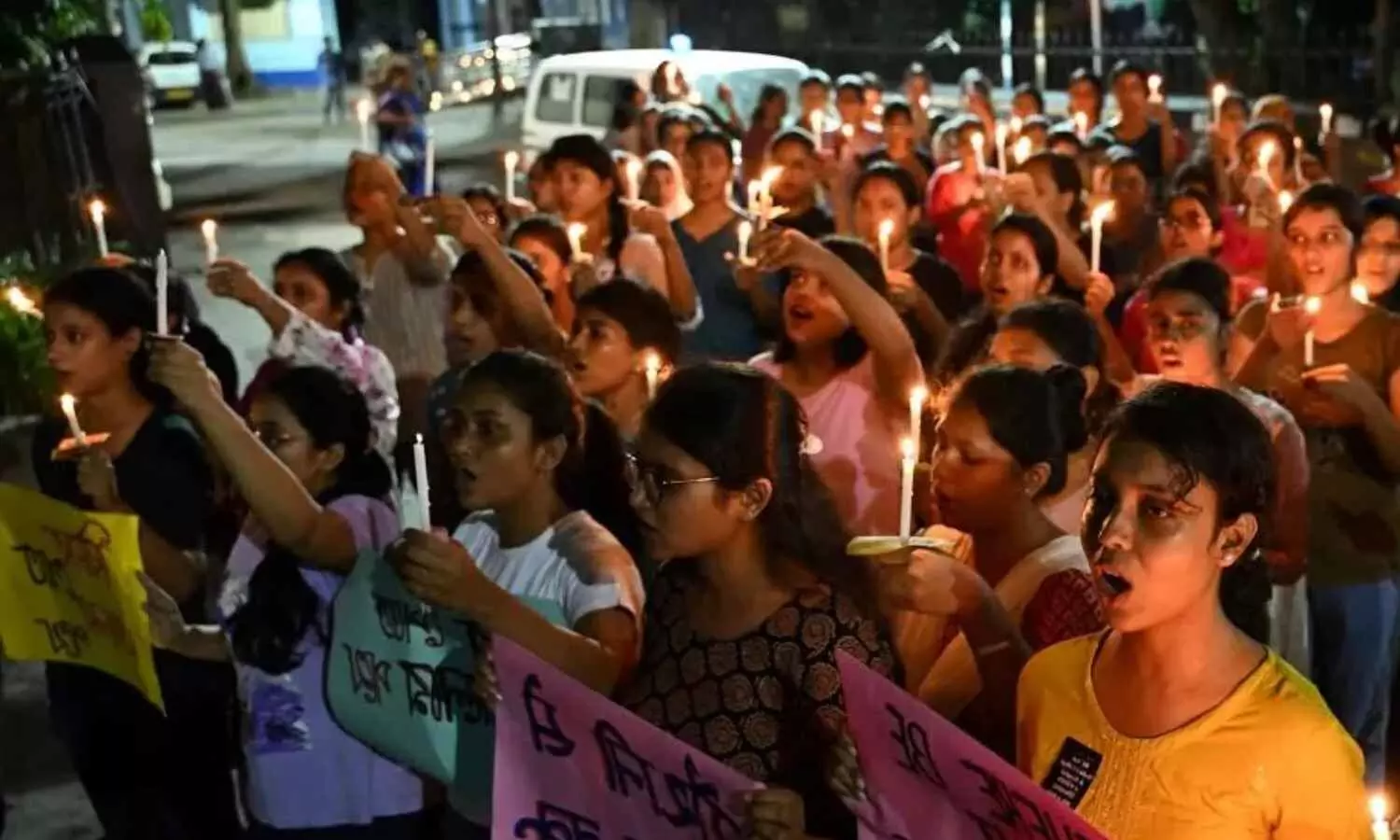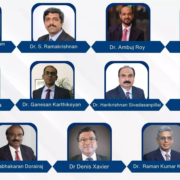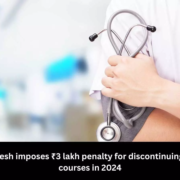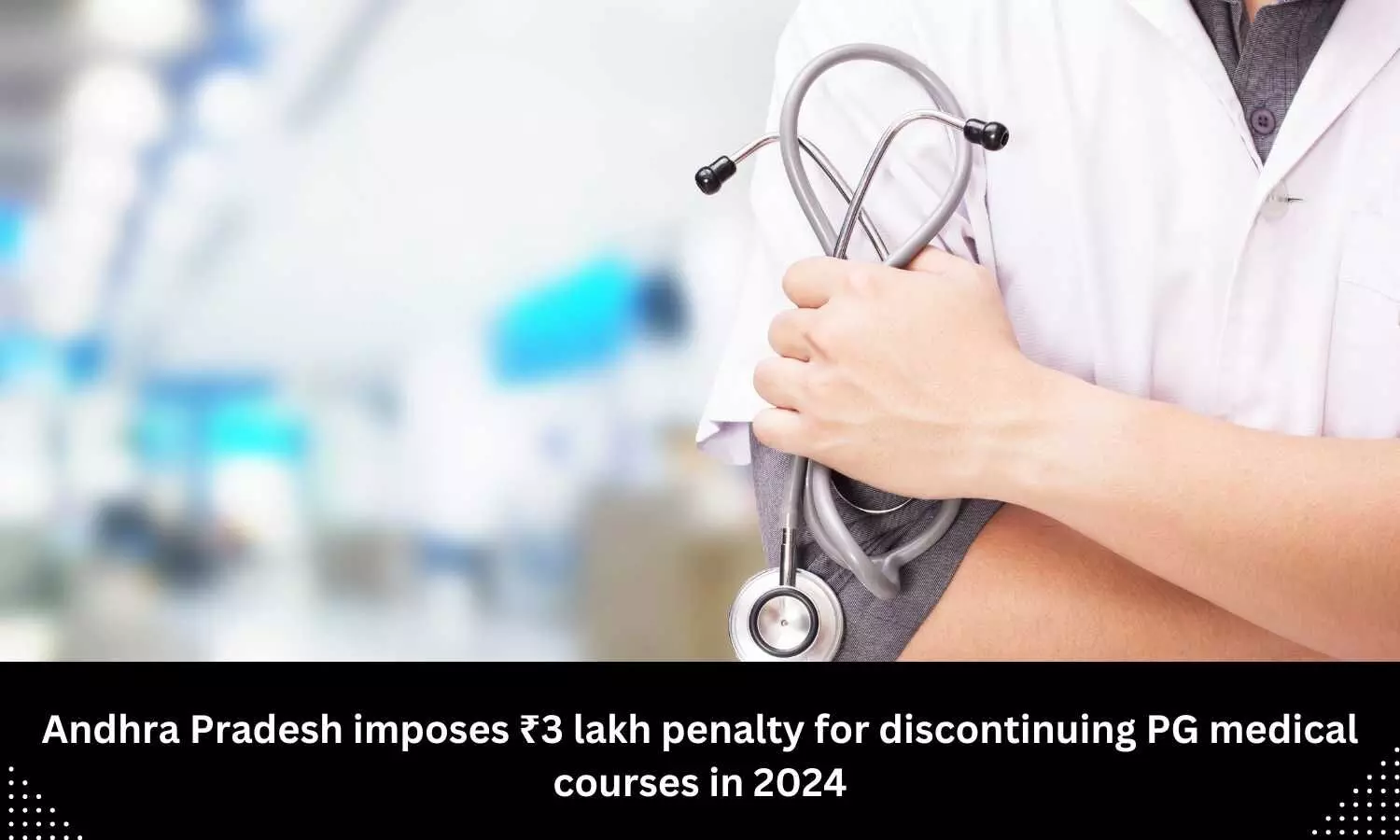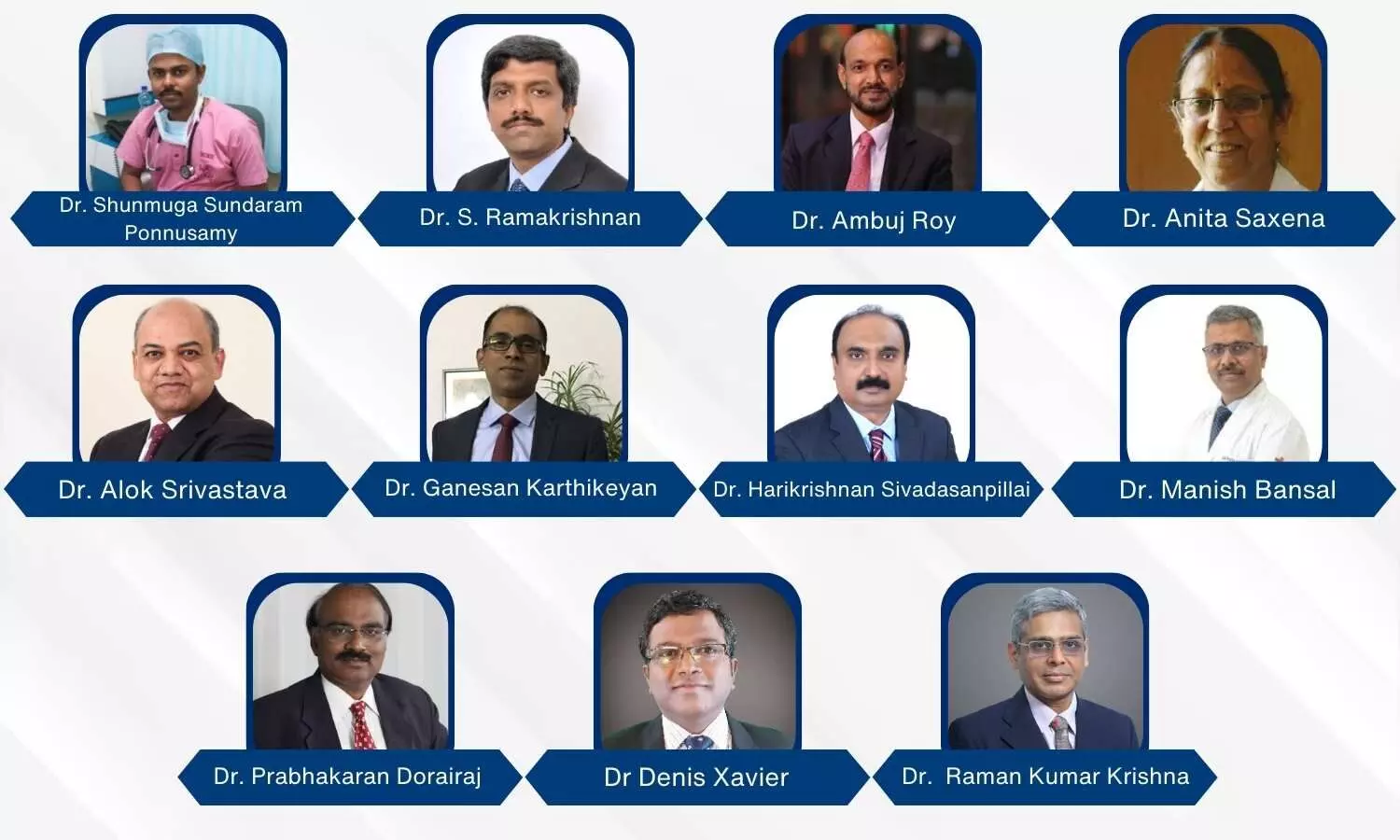
New Delhi: Altogether 12 renowned cardiologists, haematologists and scientists from various prestigious health and medical institutes across India have received recognition among the world’s top 2% of scientists in the prestigious database curated by Professor John P.A. Ioannidis of Stanford University, in collaboration with the Elsevier Data Repository. This honour acknowledges their pioneering research, clinical achievements, and consistent impact on the field.
The database of Stanford University for the year 2024 of top-cited scientists provides standardized information on citations, h-index, co-authorship adjusted hm-index, citations to papers in different authorship positions and a composite indicator (c-score). The selection is based on the top 100,000 scientists by c-score (with and without self-citations) or a 2% or above percentile rank in the sub-field.
Here are the details of the Indian Cardiologists and Scientists featured in Stanford University’s list for 2024:
Dr Ambuj Roy:
A renowned Professor of Cardiology and Head, Skill, E-Learning and Telemedicine Facility at the All India Institute of Medical Sciences (AIIMS), New Delhi, Dr. Ambuj Roy is a fellow of the American College of Cardiology, National Academy of Medical Sciences and Royal College of Physicians (Edinburgh). He is the past Convenor of the Heart Failure Council of the Cardiological Society of India.
Dr. Roy, a clinician-researcher with vast experience in managing cardiovascular disease patients in low-resource settings in the premiere medical institute of India, has been recognised as one of the top 2% scientists across the world, as per Stanford University’s list of 2024.
As per the list, Dr. Roy holds a rank of 1,25,187 in the list based on the composite score excluding self-citations, and 128,717 when all citations are included. By the end of 2023, Dr. Roy’s h-index, excluding self-citations, stands at 25, with altogether 7,925 citations for 2023 (excluding self-citations).
He is a member of the Institute Body of Jawaharlal Institute of Postgraduate Medical Education and Research, Puducherry. He also serves on several advisory committees in the Ministry of Health and Family Welfare, Govt. of India and Task Force Committee of ICMR for Cardiovascular Research in India.
His research focuses on cardiovascular epidemiology, heart failure and translational research to improve CV risk factor management using technology including MHealth. He has many seminal research papers including the role of alcohol and influenza vaccine in cardiovascular disease prevention.
Dr. Dorairaj Prabhakaran:
Professor D. Prabhakaran, who is a cardiologist and epidemiologist by training, is also an internationally renowned researcher and is the Executive Director of the Centre for Chronic Disease Control, New Delhi, a Distinguished Professor of the Public Health Foundation of India, and a Professor (Epidemiology) at the London School of Hygiene and Tropical Medicine, UK.
He heads the NIHR Centre for Global Health at Public Health Foundation of India. These centres conduct cutting-edge research to prevent chronic diseases in India and the developing world. Dr. Prabhakaran has now received recognition as one of the top 2% scientists across the world, as per the Stanford University’s list of 2024.
As per the list, Dr. Prabhakaran holds a rank of 16,180 in the list based on the composite score excluding self-citations, and 16,517 when all citations are included. By the end of 2023, his h-index, excluding self-citations, stands at 37, with altogether 10,955 citations for 2023 (excluding self-citations).
His work spans from mechanistic research to understanding the causes of increased propensity of cardiovascular diseases (CVD) among Indians to developing solutions for CVD through translational research and human resource development.
Prof. Prabhakaran is a Fellow of the Royal College of Physicians, UK, a Fellow of the National Academy of Sciences, India, a Fellow of the Indian National Science Academy and an Adjunct Professor at the Emory University. He is a member of the Executive Council of the International Society of Hypertension (ISH) and the International Society of CVD Epidemiology and Prevention (ISCEP). He has received funding from NHLBI, Wellcome Trust, the European Commission and several other international and national funding bodies.
He has mentored over 50 post-doctoral and doctoral students so far. He has authored several chapters and over 700 scholarly papers with an H index of 115. He was listed as the topmost researcher in Medicine in India in terms of publications for 2009-2014 by Scopus and Department of Science & Technology, Government of India.
He is the lead editor of the Cardiovascular Disease Volume of the latest Disease Control Priorities Project. He is the lead editor of Tandon’s textbook of Cardiology, a comprehensive book on Cardiology for Indian Cardiologists and Fellows. Recognizing his work in Chronic Diseases and Global Health, he was conferred an Honorary Doctor Of Science degree from Glasgow University.
Dr. Manish Bansal:
Dr Manish Bansal is currently Senior Director in Cardiology at Medanta- The Medicity, Gurgaon, India. He pursued his MBBS from Maulana Azad Medical College, MD in Medicine from AIIMS Delhi, DNB Cardiology from Escort Heart Institute & Research Centre, and thereafter Fellowship in Cardiac Imaging from the Department of Cardiology, University of Queensland, Brisbane, Australia.
Trained at the premier medical institutes in India and abroad, including the All India Institute of Medical Sciences and the Princess Alexandra Hospital, Brisbane, Australia, Dr Manish Bansal has had an illustrious academic career with several Gold-medals (Pathology, Pediatrics, Cardiology) and recognitions (FACC, FASE, FISCU, Excellence in Cardiology awards, etc) to his credit. He has more than twenty years of experience in treating all forms of cardiac illnesses, including coronary artery disease, valve diseases, cardiomyopathies, etc.
Dr. Bansal has special expertise in the field of early detection, prevention and management of coronary artery disease, the leading cause of death in our country. He has extensively researched in this area and has contributed significantly to the knowledge-base on this subject. He is also a leading specialist in echocardiography, with particular interest in advanced echocardiographic techniques such as stress echocardiography, strain imaging, 3D echocardiography etc.
Apart from his clinical experience, Dr Bansal is an avid researcher with more than 250 publications in leading indexed national and international journals and books. He has previously been the Editor-in-chief of Indian Heart Journal and the Journal of Indian Academy of Echocardiography & Cardiovascular Imaging and has also been on the editorial board of several leading national and international journals such as JACC Imaging and Cardiovascular Ultrasound. He has also been a mentor to students undergoing training in Cardiology and Echocardiography at Medanta- The Medicity and is regularly invited as faculty in various national and international meetings.
Now, Dr. Bansal has been recognised as one of the top 2% scientists across the world, as per the Stanford University’s list of 2024. According to the list, Dr. Bansal holds a rank of 73,458 in the list based on the composite score excluding self-citations, and 64,343 when all citations are included. By the end of 2023, his h-index, excluding self-citations, stands at 8, with altogether 585 citations for the year 2023 (excluding self-citations).
Dr. Ponnysamy Shunmuga Sundaram:
Dr. P Shunmuga Sundaram pursued his MBBS in 2005, followed by an MD degree in General Medicine (2006-2009). He also pursued DM Cardiology during 2010-2012 from Sree Chitra Tirunal Institute for Medical Sciences and Technology (SCTIMST), Thiruvananthapuram and later held the post of a Post-Doctoral Fellow in Cardiac Electrophysiology. Thereafter, he received Advanced Cardiac Electrophysiology Training from St. Luke’s Medical Centre, USA in 2014.
As per Standard University’s list of 2024, Dr. Sundaram has been recognised as one of the top 2% scientists across the world. He holds a rank of 319,279 in the list based on the composite score excluding self-citations, and 194,828 when all citations are included. By the end of 2023, his h-index, excluding self-citations, stands at 8 with altogether 283 citations for the year 2023 (excluding self-citations).
He received the Young Researcher Award from the Global Indian Electrophysiology Forum, Boston in 2024 and the Best Researcher Award- 2024 by Dr. MGR Medical University, Tamil Nadu.
Dr. Raman Krishna Kumar:
Dr. Raman Krishna Kumar is a distinguished pediatric cardiologist and he serves as the Clinical Professor and Head of the Department of Pediatric Cardiology at Amrita Hospital in Kochi. He pursued his MBBS from Maulana Azad Medical College and MD from Primary Specialty Board in Internal Medicine, All India Institute of Medical Sciences, New Delhi.
Thereafter, he pursued DM Cardiology from AIIMS, New Delhi. He also was an International Fellow of the American Heart Association (FAHA) conferred by the Council on Lifelong Congenital Heart Disease and Heart Health in the Young. Dr. Kumar was also an Honorary Fellow of Sri Lankan College of Cardiology.
Since 1998, he has played a pivotal role in establishing and leading the pediatric heart program at Amrita Hospital, Kochi elevating its status through exceptional clinical services, research endeavors, and training programs.
Dr. Raman Krishna Kumar has been recognised as one of the top 2% scientists across the world, as per the the Stanford University’s list of 2024. According to the list, Dr. Kumar holds a rank of 78,155 in the list based on the composite score excluding self-citations, and 69,519 when all citations are included. By the end of 2023, his h-index, excluding self-citations, stands at 12, with altogether 2,091 citations for the year 2023 (excluding self-citations).
Dr. Kumar’s clinical focus spans echocardiography, catheter interventions, and intensive care, catering to the diverse needs of his patients. With over 250 publications and a commitment to advancing pediatric cardiac care, Dr. Krishna Kumar’s legacy continues to impact the lives of young patients globally, shaping the future of pediatric cardiology.
Dr. Ganesan Karthikeyan:
Dr. Ganesan Karthikeyan pursued his MBBS from the Jawaharlal Institute of Postgraduate Medical Education and Research (JIPMER) in 1993. Thereafter, he pursued MD in General Internal Medicine in 1997 from JIPMER. He also pursued DM Cardiology from All India Institute of Medical Sciences (AIIMS). He worked at the Department of Cardiology of AIIMS for more than 22 years. As per the institute’s website, Prof Karthikeyan is currently on deputation to Translational Health Science and Technology Institute, Faridabad.
Stanford University’s list of 2024 also recognised Dr. Ganesan Karthikeyan as one of the top 2% of scientists across the world. According to the list, Dr. Karthikeyan holds a rank of 90,367 in the list based on the composite score excluding self-citations, and 72,437 when all citations are included. By the end of 2023, his h-index, excluding self-citations, stands at 19, with altogether 5,244 citations for the year 2023 (excluding self-citations).
Dr. Denis Xavier:
Dr. Denis Xavier pursued his MBBS from St. John’s Medical College, Bangalore in 1992. Thereafter, he pursued MD Pharmacology from Bangalore University and MSc in Clinical Epidemiology and Biostatistics from McMaster University, Hamilton, Ontario, Canada.
He is the Head of the Clinical Research and Training Division at St. John’s Research Institute and he also Heads the Pharmacology Department of St John’s Medical College.
Dr. Xavier has now been recognised as one of the top 2% scientists across the world, as per the Stanford List for 2024, for his research on Cardiovascular Systems and Hematology.
According to the list, he holds a rank of 92,825 in the list based on the composite score excluding self-citations, and 99,958 when all citations are included. By the end of 2023, his h-index, excluding self-citations, stands at 36, with altogether 10,061 citations for the year 2023 (excluding self-citations).
Dr. Sivadasanpillai Harikrishnan:
Dr. Sivadasanpillai Harikrishnan pursued his MBBS from the Medical College in Trivandrum in 1991. Thereafter he pursued MD in General Medicine from the University of Calicut and DM Cardiology from Sree Chitra Tirunal Institute for Medical Sciences and Technology (SCTIMST), Trivandrum.
He also holds a DNB Cardiology Degree from the National Board and Commonwealth Fellowship in Coronary Interventions from Leeds University, U.K. He also attended the Public Health Leadership and Implementation Academy Programme from Emory University, Atlanta, USA in 2014-2015. He has been the Head of the Cardiology Department at SCTIMST since 2023.
According to Stanford University’s list for 2024, Dr. Harikrishnan has been recognised as one of the top 2% of scientists across the world. As per the list, Dr. Harikrishnan holds a rank of 99,243 in the list based on the composite score excluding self-citations, and 94,564 when all citations are included. By the end of 2023, his h-index, excluding self-citations, stands at 20, with altogether 7,173 citations for the year 2023 (excluding self-citations).
Dr. Harikrishnan received the MS Valiathan award for the “Outstanding Research Investigator Award” by SCTIMST in 2022 and Amrut Mody Unichem Prize in 2018 from the Indian Council of Medical Research (ICMR) for excellence in research in the field of cardiology, Heart Failure. Further, he received Society for Heart Failure and Transplantation (SHFT) Excellence in Publication Award in 2018 and “Challenging Case – OCT” award in the Advanced Cardiovascular Therapeutics, Chennai, 2015. Dr. Harikrishnan also won the best case award in the National Interventional Council meet of Cardiological Society of India, Hyderabad, April 26, 2009.
Dr. Asru K. Sinha:
Dr. Asru K. Sinha, from Sinha Institute of Medical Science and Technology, Kolkata, has also been recognised as one of the top 2% of scientists across the world, as per the Stanford University’s list of 2024. According to the list, Dr. Sinha holds a rank of 101,194 in the list based on the composite score excluding self-citations, and 116,729 when all citations are included. By the end of 2023, his h-index, excluding self-citations, stands at 3, with altogether 284 citations for the year 2023 (excluding self-citations).
Dr. Alok Srivastava:
Dr. Alok Srivastava works as a Professor and Head of the Department of Haematology at the Christian Medical College, Vellore. He pursued his MBBS and MD in General Medicine from the University of Madras and thereafter was a Fellow of the Royal Australasian College of Physicians in 1993. He also was a Fellow of the Royal College of Physicians, UK in Haematology in 2004.
He also Heads the Centre for Stem Cell Research at CMC Vellore. Dr. Srivastava is also Chair of the National Apex Committee of the Stem Cell Research and Therapy, DHR, Union Government, and Vice-Chair of the Centre for International Blood and Marrow Transplantation Research, USA. Further, he also is the Vice-President of World Federation of Hemophilia, Canada.
As per Stanford University’s list of 2024, Dr. Alok Srivastava has also been recognised as one of the top 2% of the scientists across the world. According to the list, Dr. Srivastava holds a rank of 123,118 in the list based on the composite score excluding self-citations, and 119,421 when all citations are included. By the end of 2023, his h-index, excluding self-citations, stands at 10, with altogether 678 citations for the year 2023 (excluding self-citations).
Dr. Anita Saxena:
Dr. Anita Saxena, MD, DM (Cardiology), FACC is a Cardiologist of International repute. Before joining Pt. B D Sharma University of Health Sciences and Research at Rohtak, she has held the positions of Dean of Academics, Chief Cardiothoracic Centre and Head of the Cardiology department at the prestigious All India Institute of Medical Sciences, New Delhi. She has over 36 years of professional experience in clinical work, research, and teaching.
Dr Saxena has worked extensively in the subspecialty of Pediatric Cardiology and is an authority on congenital and rheumatic heart diseases. She has led a number of projects for advancing the care of children with heart diseases and has been instrumental in starting dedicated structured training program, DM in Pediatric Cardiology, at the All India Institute of Medical Sciences, New Delhi.
She has over 330 papers published in reputed national and international journals, with a total citation index of over 6700. In addition, she has completed a number of large community-based projects related to public health. She has been teaching DM Cardiology students for more than 36 years and more than 40 doctoral students have completed research projects under her guidance. She has formulated and published national guidelines for the management of congenital heart disease in India.
Dr. Anita Saxena has also received recognition as one of the top 2% scientists across the world under the Stanford University’s list of 2024. As per the list, Dr. Saxena holds a rank of 146,683 in the list based on the composite score excluding self-citations, and 150,221 when all citations are included. By the end of 2023, her h-index, excluding self-citations, stands at 8, with altogether 439 citations for the year 2023 (excluding self-citations).
Dr. Saxena has been frequently invited as an expert group member by the Ministry of Health and Family Welfare, Government of India, Indian Council of Medical Research and other national bodies for formulation of policies and guidelines related to the specialty of cardiology. She is a member of several International Advisory Boards related to Rheumatic heart disease and community health, including Task Force on “Rheumatic Heart Disease” by World Heart Federation. Dr Saxena has also served at Wessex Health Sciences Centre in United Kingdom and has been a Visiting Professor of Pediatric Cardiology, Children’s Hospital, University of Manitoba, Canada from 2001-2010. Dr Saxena has served as President of Asia Pacific Pediatric Cardiac Society, Pediatric Cardiac Society of India, and is a member of several other national and international societies, including National Academy of Medical Sciences and a fellow of American College of Cardiology.
Dr. Sivasubramanian Ramakrishnan:
Dr. Sivasubramanian Ramakrishnan is a Professor at the Cardiology Department of the All India Institute of Medical Sciences (AIIMS), New Delhi. He pursued his MBBS from Madurai Medical College and MD (Medicine) from King George Medical College, Lucknow. He joined the Cardiology Department of AIIMS as a Senior Resident in 2001. After completing his DM in 2004, he worked as a faculty member at the GB Pant hospital, New Delhi before rejoining AIIMS as Assistant Professor in October 2005.
He is actively involved in clinical research, patient care, and educational activities. Dr. Ramakrishnan has authored around 170 publications in indexed journals and his papers have been cited more than 3500 times. He has won numerous awards including D P Basu award, Nanda award, Sujoy B Roy award, Best poster awards in ACC, AEPC and APPCS, Young investigator award in PCSI, APPCS and Col Chopra award. He is involved in providing tertiary patient care services to a vast majority of population, with the quality of care comparable to any cardiac center in the world.
As per Stanford University’s list of 2024, Dr. Sivasubramanian Ramakrishnan has received recognition as one of the top 2% scientists across the world. According to the list, Dr. Ramakrrishnan holds a rank of 272,197 in the list based on the composite score excluding self-citations, and 165,267 when all citations are included. By the end of 2023, his h-index, excluding self-citations, stands at 8, with altogether 375 citations for the year 2023 (excluding self-citations).
He has also organized several updates, national and international conferences and cardiology workshops. As a faculty member at AIIMS, he has been predominantly involved in Clinical Cardiology & interventional cardiology. Apart from his academic, clinical and research work he has attained a high degree of proficiency in interventions. He has performed a few innovative interventions and he is among the first to use alcohol ablation for RVOT obstruction. Dr Ramakrishnan is also awarded a Fellowship of the ACC (American college of Cardiology) and FSCAI.
Also Read: 13 Gynaecologists, Scientists earn global recognition in Standford University 2024 list of World’s Top 2% Scientists



